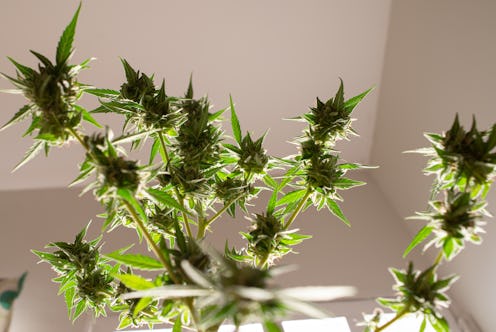Health
What Happens When You Take CBD & Antidepressants
A doctor explains why there are “a couple of concerns.”

There’s no denying that CBD, aka cannabidiol, has been the reigning trend of the last few years, and shows no signs of stopping. From edible products and tinctures, to bath and beauty products, CBD was (and is) everywhere. Though touted as a natural, holistic, and safe way to manage a variety of health issues, you may be wondering if you can take CBD and antidepressants together. And while CBD is touted as an all-natural supplement with some evidence that it can be good for your health, it's possible that your CBD latte can still impact the efficacy of different medications — including antidepressants.
According to statistics from the National Alliance on Mental Illness (NAMI), one in five U.S. adults live with a mental illness in any given year. Furthermore, as NBC News reported, a 2016 study revealed one in six people in the U.S. take some type of psychiatric medication, with antidepressants being the most widely prescribed. Limited research has shown that CBD may help alleviate symptoms of anxiety and sleep issues, as well as lower levels of inflammation in the body, though this research (and the dosages needed for these effects) is nowhere near conclusive. And that means you need to be careful if you're choosing to consume it.
“Generally speaking, you can safely use CBD supplements when you’re taking antidepressants. However, there are a couple of concerns,” Dr. Peter Grinspoon, M.D., an instructor in medicine at Harvard Medical School, and the author of the memoir Free Refills: A Doctor Confronts His Addiction, tells Bustle. “The first concern is that CBD isn’t regulated by the FDA. You have to be careful that the CBD you’re getting is from a reliable supplier. For example, Consumer Reports recently put out an article on how to go shopping for CBD because they’ve done tests, and found some [supplement] formulations had no CBD. Some were inaccurately labeled, and other formulations even had some THC in them.” (THC is the cannabis compound that, unlike CBD, can get you high.)
The 2018 passing of the bipartisan Farm Bill legalized the production of hemp on an industrial scale for the first time in the U.S. — which means it’s that the CBD industry will only continue to grow. However, this doesn’t necessarily mean there will be more oversight or required research.
So, what can potentially happen if you take CBD oil and antidepressants? Unfortunately, because there’s a limited amount of studies to draw from, Grinspoon says, “CBD does have hypothetical drug interactions; the question is whether these are clinically important or not.”
The reason for this is that CBD inhibits two main enzyme systems, Grinspoon explains. Enzymes are proteins that speed up chemical reactions in the body, and play an important role in functions like digestion and respiration. They also help you metabolize antidepressants. “One system is the same one that grapefruit inhibits — the technical name is the CYP34A enzyme system. So, just like grapefruit juice, CBD can cause your body to have higher doses of benzodiazepines [anti-anxiety medications], or certain antipsychotic medications,” Grinspon explains.
What’s more, Grinspoon says that CBD also inhibits “the system that metabolizes a lot of serotonin reuptake inhibitors (SSRIs), tricyclic antidepressants, and antipsychotics as well.” Meaning, taking CBD supplements while on these psychiatric medications could hypothetically interfere with how these medications are metabolized.
Despite this, Grinspoon explains that this is typically not a large cause of concern for a majority of people on antidepressants or other psychiatric medications. “Certainly, if someone is on a very delicately balanced medical regiment, CBD could knock that out of whack because of the two different enzyme systems it inhibits. In terms of actual clinical practice, I haven’t heard any stories of people having clinical decompensation because of adding CBD to their regime,” he says.
When it comes down to it, Grinspoon says that the potential interactions should be regarded as more “hypothetical than real,” and that the side effect profile of CBD is “very minimal.” Of course, it’s always good to have a conversation with your physician about potential interactions, and to disclose any prescribed or over-the-counter medications and supplements you are taking. At the end of the day, using CBD supplements while on antidepressants is an individual choice, but it's important to go in informed.
Readers should note that the regulations and data surrounding marijuana, CBD, and other related products are still developing. As such, the information contained in this post should not be construed as medical or legal advice. Always consult with your doctor before trying any substance or supplement.
Expert:
Dr. Peter Grinspoon, M.D., author and instructor in medicine at Harvard Medical School
Studies Cited:
Moore TJ, Mattison DR. Adult Utilization of Psychiatric Drugs and Differences by Sex, Age, and Race. JAMA Intern Med. 2017;177(2):274–275. doi:10.1001/jamainternmed.2016.7507